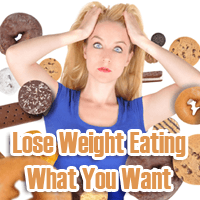
Evelyn Tribole, M.S., R.D., may be one of the only dietitians to tell you to eat French fries and chocolate cake. But her advice is sensible and practical when applied within the context of her intuitive-eating principles–a way of eating that emphasizes a healthful mind-set about food vs. focusing on “good” and “bad” foods.
 A competitive runner who qualified for the 1984 Olympic marathon trials, Tribole’s interest in nutrition stemmed from wanting to know what to eat to run faster. It wasn’t until the early 1990s, when she was working with celebrities at Columbia Pictures and was frustrated when they regained weight they lost, that she looked into the psychology behind eating.
A competitive runner who qualified for the 1984 Olympic marathon trials, Tribole’s interest in nutrition stemmed from wanting to know what to eat to run faster. It wasn’t until the early 1990s, when she was working with celebrities at Columbia Pictures and was frustrated when they regained weight they lost, that she looked into the psychology behind eating.
Now, rather than suggesting diets where people can only eat this and not that, she tells them to eat anything. The catch: They must recognize when they’re hungry, eat only when they are and then stop when they feel satisfied.
Q: What is intuitive eating?
A: It’s an approach that helps you have a healthy relationship– mentally and physically–with food. Intuitive eating is the opposite of dieting: You reject rules for what to eat and not eat. Instead, you listen to and trust your body’s natural cues of hunger and fullness.
In other words, you eat when you’re hungry and stop when you’re full. If you’re following dieting rules and feeling unsatisfied, chances are you’re constantly thinking about food. When you eat intuitively, you pay attention to whether a meal was enjoyable and whether it sustained you for the next few hours.
Q: Can eating intuitively help someone lose weight?
A: Well, first I want to say that research suggests that dieting doesn’t work–many studies have shown that even when dieters lose weight they often end up regaining what they lost, and sometimes even more. But a series of studies done in Italy that taught people to essentially eat intuitively found that people who needed to lose weight lost and those who didn’t need to lose maintained their weight eating this way. I’ve seen this in my patients too.
If they’re already at a healthy weight, then their weight stays in the healthy range, and if they need to lose, they naturally do. The problem is a lot of people still want to be thinner, even if they’re at a healthy weight.
Q: How can someone start eating intuitively?
A: A few questions to ask yourself are: Do you have rigid rules about food? Are you an emotional eater? Can you recognize hunger? Generally, I find that hunger is a good place to start. If someone doesn’t know how to recognize when they’re hungry or full, it’s going to be hard to tackle the other principles, like ditching strict food rules.
A lot of people are good at the extreme– ‘I’m going to pass out, I’m so hungry”–but they miss gentle hunger signs and as a result they get too hungry, which makes it easy to overeat. And often people don’t pay attention when they eat, so they eat well past the point of being satisfied.
Q: How can people cue into feeling full if they’re not used to doing so?
A: Start by taking time out to listen to your body and what you need. In the beginning, pick one meal a day to really pay attention to. While you’re eating, truly taste the food and notice what’s going on in your body. Ask yourself how the food tastes. Is it meeting your expectation? Where’s your hunger level? Where’s your fullness? Are you satisfied?
All of this can be incredibly difficult to do. People are so used to checking e-mail, reading, or having the TV on that eating a meal without any distraction is a good first step. Doing so can be very freeing.
Q: Intuitive eating includes this idea of “unconditional permission to eat,” meaning no food is taboo. But will this lead people to eat too many “forbidden” foods?
A: I hear this a lot. When you remove the guilt from eating certain foods and know that you can have it again another time, you get to ask yourself, “How does the food taste? Am I satisfied? Do I like how I feel physically?”
I had a patient who was addicted to French fries, and what she discovered by giving herself permission to eat them was “while I do love French fries, I’m no longer willing to have them when they’re cold and limp” and she ended up having them less and less often and only when they were perfect. Even if someone’s been eating this food for a long time, when they give themselves permission it’s often the first time they’re truly tasting it.
Q: You’ve talked about how it’s OK to eat French fries and chocolate, but where does healthy eating come in?
A: Once you’re in touch with your hunger, fullness and satisfaction, then you integrate health. You can think about what your body might need nutritionally. When people are attuned to their bodies, healthy eating actually feels good and is not done out of penance.
– Kerri-Ann Jennings, M.S., R.D.
EatingWell is a magazine and website devoted to healthy eating as a way of life. Online at www.eatingwell.com.
(c) 2012 Eating Well, Inc. DISTRIBUTED BY TRIBUNE MEDIA SERVICES, INC.

